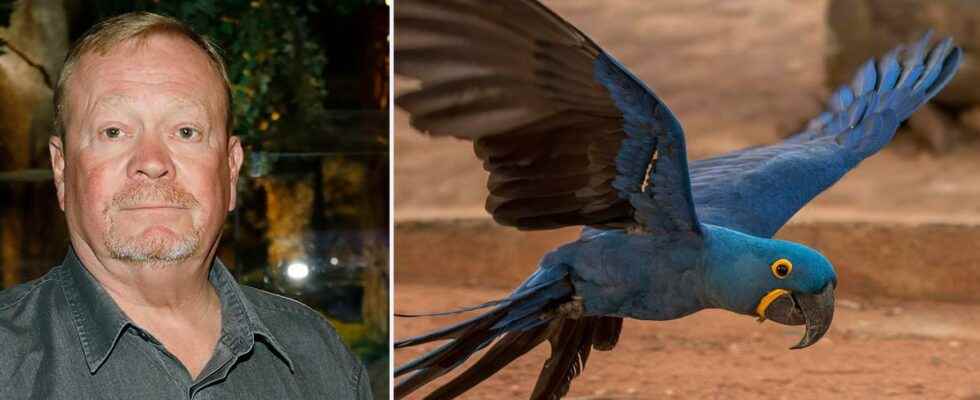Published: Just now
Jonas Wahlström has used his position as zoo owner to trade in endangered animals.
According to DN, the director of Skansen-Akvariet has made millions from the deals.
– It is a lie, he tells Aftonbladet.
Jonas Wahlström, 70, founder and owner of Skansen-Akvariet, has for several years bred and traded endangered animals, including parrots, on his farm.
As a zoo manager, he has been allowed to handle rare animal species at home, something private individuals are not allowed to do. Therefore, he has also been able to breed red-listed and highly sought-after parrot species, which he partly gave to himself and partly sold to private individuals and companies.
An example is the hyacinth, where a specimen can command 100,000 kroner, writes Dagens Nyheter who has reviewed Jonas Wahlström’s business.
“Difficult to review”
According to DN, there is an unclear boundary between Jonas Wahlström and Skansen-Akvariet and it is unclear how assets are distributed between him and the zoo. Since 2010, he has taken out SEK 16 million in dividends from the company, in addition to his salary. In the same period, Wahlström has had income from capital of SEK 30 million, the newspaper writes.
– As an official, it has been very difficult to review this. You don’t really know where Skansen-Akvariet ends and where Jonas Wahlström’s own business begins, says a source that DN spoke to.
In addition to the Swedish Agricultural Agency and the County Administrative Board, authorities in Denmark, Switzerland, Norway and Italy have inspected Wahlström’s handling of endangered animal species, writes DN.
– We were very suspicious. The required certificates were missing and we became particularly worried because they are such expensive birds, says Maj Friis Munk at the Danish Environmental Agency to DN regarding a lifetime loan of hyacinth cages from Jonas Wahlström to a Danish bird trader.
– It is inappropriate for a zoo to hand over animals to private individuals or businesses that are not zoos, says Sara Sundin, head of unit at the County Administrative Board in Stockholm County to DN.
“Not very remarkable”
When Aftonbladet reaches Jonas Wahlström, he believes that DN has deliberately chosen to angle the article on the fact that it is ugly to make money from wild animals.
– If they are legal from the start and if you contribute to breeding, I don’t think it is particularly remarkable, says Jonas Wahlström.
In the case of the hyacinths, it is the fruit of the parrots’ “spare eggs”. The species always lays two eggs, one of which is poked away and dies. He has saved the spare eggs, hatched them artificially and hand-fed the chicks, he says.
– It was a surplus, so to speak, more than should have been born, and they were sold commercially with the permission of the Swedish Board of Agriculture.
– I have contributed to breeding red-listed parrots. Most end up in zoos for further breeding and some end up with private breeders who continue to breed, I see nothing wrong with profiting from it. It actually costs money to both build and run a facility for this, he says.
“It’s a lie”
– I am proud that they have chosen to send two of their most skilled reporters, both of whom have received the Great Journalism Award, to examine me in particular.
He continues:
– But joking aside, they have angled it very much. They have made it so that I would have earned SEK 30 million in these twelve years. It’s a lie.
On the other hand, he has had a share dividend and made share gains as a result of favorable share placements, says Jonas Wahlström.
How about the allegedly fluid boundaries between the zoo and you?
– There are no secrets for the authorities. I have never had a remark or remark either from the Swedish Board of Agriculture, the County Administrative Board or the Swedish Environmental Protection Agency.
Appeared in pet stores
On Tuesday publish DN new data that several of Skansen-Akvariet’s animals have appeared in pet stores that have wanted to attract customers and visitors.
At the turn of the millennium, two dwarf marmosets were sold to a pet store on Värmdö. They described themselves as a “branch” of Skansen-Akvariet, according to public documents.
The shop owner tells DN that he paid SEK 10,000 each for the two monkeys that have since multiplied in the shop. Jonas Wahlström denies the information that the pet store has functioned as a branch.
The animals were sold as “surplus animals” – Skansen-Akvariet had “too many, simply”, according to Jonas Wahlström.
Another example is a python that was found in a plastic box on a warehouse in a pet store in Johanneshov in 2012. It also came from Skansen-Akvariet. The County Administrative Board filed a criminal complaint against the owners for suspected crime. The store lacked a permit to sell endangered animals.
Jonas Wahlström first says that he has not given a snake to the pet store in Johanneshov, but changes his mind when DN shows documents from the County Administrative Board with Wahlström’s signature.
